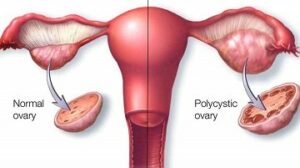Polycystic Ovary Syndrome (PCOS) is a common and complex hormonal disorder affecting individuals of reproductive age. Characterized by a range of symptoms such as irregular periods, hormonal imbalances, and cysts on the ovaries, PCOS can have significant impacts on a person’s overall well-being. While modern medicine offers various treatments, many individuals are turning to Ayurveda, an ancient holistic healing system, to find natural and sustainable solutions for managing PCOS. In this blog, we explore the principles of Ayurveda and how Ayurveda for PCOS helps alleviate symptoms and foster a sense of well-being for those navigating the challenges of PCOS.
Contents
What Is The Role Of Ayurveda For PCOS?
 Ayurveda, the ancient holistic healing system originating from India, plays a significant role in addressing Polycystic Ovary Syndrome (PCOS) by viewing it through the lens of dosha imbalances. According to Ayurvedic principles, PCOS is often associated with disruptions in the three fundamental doshas—Vata, Pitta, and Kapha—resulting in irregularities in the menstrual cycle, hormonal imbalances, and the formation of ovarian cysts.
Ayurveda, the ancient holistic healing system originating from India, plays a significant role in addressing Polycystic Ovary Syndrome (PCOS) by viewing it through the lens of dosha imbalances. According to Ayurvedic principles, PCOS is often associated with disruptions in the three fundamental doshas—Vata, Pitta, and Kapha—resulting in irregularities in the menstrual cycle, hormonal imbalances, and the formation of ovarian cysts.
The essence of Ayurveda lies in personalized treatment, as it recognizes the unique constitution of each individual and tailors interventions to restore balance within the body. Ayurvedic approaches to PCOS management encompass a holistic framework that integrates dietary modifications, herbal supplements, lifestyle adjustments, and mindfulness practices. By addressing the root causes and promoting overall well-being, Ayurveda offers a comprehensive and individualized approach to managing PCOS.
What Are The Principles Of Ayurveda For PCOS?
Ayurveda, with its holistic approach to health, offers a set of principles for managing Polycystic Ovary Syndrome (PCOS) by addressing the underlying imbalances in the body. Here are the key principles of Ayurveda for PCOS:
- Balancing the Doshas
Ayurveda identifies three doshas—Vata, Pitta, and Kapha—as the fundamental energies governing the body. PCOS is often associated with imbalances in these doshas. Ayurvedic interventions aim to identify the specific doshic imbalances in an individual and restore equilibrium with various strategies.
- Nourishing and Sattvic Diet
Ayurveda emphasizes the importance of a nourishing and sattvic (pure) diet to support overall well-being. For PCOS, dietary recommendations typically include whole, unprocessed foods that help regulate blood sugar levels, reduce inflammation, and support hormonal balance.
- Herbal Remedies and Supplements
Ayurvedic practitioners often prescribe herbal formulations and supplements to address hormonal imbalances and support reproductive health. Adaptogenic herbs like ashwagandha and shatavari are commonly recommended for their potential to modulate stress, regulate menstrual cycles, and enhance fertility.
- Individualized Approach
One of the core tenets of Ayurveda is its recognition of individual differences. PCOS manifests uniquely in each person, and Ayurvedic interventions are tailored to the individual’s constitution, imbalances, and specific symptoms.
- Mind-Body Connection
Ayurveda acknowledges the intimate connection between the mind and body. Stress management, emotional well-being, and positive mental health practices are integral to addressing PCOS symptoms, as stress can exacerbate hormonal imbalances.
By integrating these Ayurvedic principles, individuals with PCOS can adopt a comprehensive and personalized approach to address the root causes of their condition and promote long-term well-being. It is advisable to consult with an experienced Ayurvedic practitioner for personalized guidance and treatment plans.
What Are Some Examples Of Ayurvedic Treatment For PCOS?
 Ayurvedic treatments for PCOS involve a holistic approach that combines several procedures. Here are some examples of Ayurvedic treatments for PCOS:
Ayurvedic treatments for PCOS involve a holistic approach that combines several procedures. Here are some examples of Ayurvedic treatments for PCOS:
Dietary Modifications
- Balanced and Nourishing Diet: Ayurveda emphasizes the importance of a diet. This supports overall well-being and addresses specific imbalances associated with PCOS. Whole, unprocessed foods, such as fresh fruits, vegetables, whole grains, and lean proteins, form the foundation. These foods provide essential nutrients and fiber while minimizing the intake of processed and sugary foods, which can contribute to insulin resistance and hormonal imbalances.
- Warm Spices: Ayurveda utilizes warming spices like turmeric, cumin, and ginger for their digestive and anti-inflammatory properties. Turmeric, in particular, contains curcumin, known for its potential to reduce inflammation and support hormonal balance. Incorporating these spices into meals can enhance digestion and contribute to overall wellness.
Herbal Remedies
- Ashwagandha (Withania somnifera): As an adaptogenic herb, ashwagandha is believed to help the body adapt to stress and regulate the endocrine system. It may specifically benefit individuals with PCOS by reducing stress-related hormonal imbalances and supporting reproductive health.
- Shatavari (Asparagus racemosus): Shatavari is recognized for its nourishing and rejuvenating effects on the female reproductive system. It may help regulate menstrual cycles, support ovarian function, and balance hormones. Shatavari is often recommended for women experiencing hormonal imbalances, including those with PCOS.
Lifestyle Modifications
- Regular Exercise: Engaging in regular, moderate exercise is crucial for managing PCOS. Exercise helps improve insulin sensitivity, regulate menstrual cycles, and reduce stress. Ayurveda often recommends exercises that are gentle yet effective. Such as yoga. Yoga poses and breathing exercises can be tailored to support reproductive health and balance the body’s energy.
- Stress Management: Chronic stress can contribute to hormonal imbalances, exacerbating PCOS symptoms. Ayurveda places a strong emphasis on stress reduction through practices like meditation, deep breathing exercises, and mindfulness. These techniques promote relaxation, reduce cortisol levels, and positively impact hormonal equilibrium.
Detoxification (Panchakarma)
- Panchakarma Therapies: Panchakarma is an Ayurvedic detoxification process that aims to eliminate toxins and restore balance in the body. While not always necessary for every individual with PCOS, specific Panchakarma therapies like Basti (medicated enema) or Vamana (therapeutic vomiting) may be recommended. This is actually based on the individual’s constitution and the nature of their imbalances. These therapies are performed under the guidance of an experienced Ayurvedic practitioner.
- Individualized Detox Plans: Detoxification plans are personalized to address the unique imbalances of each person. The goal is to remove accumulated toxins that may contribute to hormonal disruptions. Thus, supports the body’s natural healing mechanisms.
Ayurvedic Medications
- Triphala: This traditional Ayurvedic formula is a combination of three fruits—amalaki, bibhitaki, and haritaki. Triphala is renowned for its gentle detoxifying properties, promoting healthy digestion, and supporting the elimination of toxins from the body. By enhancing digestive function, it indirectly contributes to hormonal balance and overall well-being.
- Guggul: Guggul is derived from the resin of the Commiphora mukul tree and has been used in Ayurvedic medicine for its anti-inflammatory and lipid-lowering properties. It may be recommended for individuals with PCOS to help regulate cholesterol levels and support metabolic health, which is often interconnected with hormonal imbalances.
Pranayama (Breathing Exercises)
- Nadi Shodhana (Alternate Nostril Breathing): Nadi Shodhana is a pranayama technique that involves breathing through alternate nostrils. It is believed to balance the flow of vital energy (prana) in the body, promoting mental clarity, reducing stress, and harmonizing the nervous system. Regular practice of Nadi Shodhana may help alleviate stress-related hormonal imbalances associated with PCOS.
Ayurvedic Therapies for PCOS
- Abhyanga (Ayurvedic Oil Massage): Abhyanga involves the application of warm, herbal oils to the body. This practice is thought to nourish the tissues, improve circulation, and promote relaxation. For individuals with PCOS, Abhyanga may help reduce stress and support the overall balance of the endocrine system.
- Udvartana (Herbal Scrub Massage): Udvartana is a massage using herbal powders, often with exfoliating and detoxifying properties. This treatment is believed to enhance lymphatic drainage, promote circulation, and support detoxification, potentially benefiting individuals with PCOS by addressing underlying imbalances.
It’s crucial to consult with a qualified Ayurvedic practitioner to receive personalized guidance. And ensure that the chosen treatments align with individual health needs. Overall, Ayurveda is often used as a complementary approach to conventional medical treatments for PCOS.
Does Ayurveda Cure PCOS Completely?
 Ayurveda does not claim to “cure” PCOS (Polycystic Ovary Syndrome) in the sense of providing a guaranteed and permanent elimination of the condition. PCOS is a complex hormonal disorder with multifaceted causes, and individual responses to treatment can vary.
Ayurveda does not claim to “cure” PCOS (Polycystic Ovary Syndrome) in the sense of providing a guaranteed and permanent elimination of the condition. PCOS is a complex hormonal disorder with multifaceted causes, and individual responses to treatment can vary.
Ayurveda approaches health holistically, aiming to address the root causes of imbalances rather than merely alleviating symptoms. Ayurveda for PCOS focuses on restoring harmony to the body, balancing doshas (Vata, Pitta, and Kapha), and supporting overall well-being. While many individuals with PCOS report positive outcomes and improvements in symptoms through Ayurvedic interventions, it’s important to note that the condition is chronic and may require ongoing management.
All in all, Ayurveda for PCOS can be a valuable complementary approach. Individuals considering Ayurveda for PCOS should work closely with a qualified Ayurvedic practitioner. Thus, regular monitoring, follow-ups, and adjustments to the treatment plan may be necessary for long-term management.
Conclusion
In conclusion, Ayurveda for PCOS offers a holistic and individualized approach by addressing the root causes of hormonal imbalances. Through personalized dietary modifications, herbal remedies, lifestyle adjustments, and, in some cases, detoxification procedures, Ayurveda seeks to restore balance within the body’s doshas and promote overall well-being. While Ayurveda does not claim to provide a guaranteed cure for PCOS, it has shown promise in alleviating symptoms, regulating menstrual cycles, and enhancing reproductive health.
Therefore, the integration of warm spices, herbal formulations like ashwagandha and shatavari, and stress-reducing practices such as yoga and meditation underscores the comprehensive nature of Ayurvedic treatments. Individuals navigating the challenges of PCOS are encouraged to work closely with qualified Ayurvedic practitioners.
If you are facing PCOS related issues, pcos treatment at HerMantra can help. Book your free trial online pcos treatment session now.


